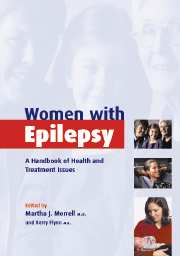Book contents
- Frontmatter
- Contents
- List of contributors
- Part I The woman with epilepsy
- Part II Epilepsy diagnosis and treatment
- 5 The genetics of epilepsy
- 6 Epilepsy: epidemiology, definitions, and diagnostic procedures
- 7 Antiepileptic drugs and other treatments for epilepsy
- 8 Epilepsy in children and adolescents
- 9 Nonepileptic seizures
- Part III Hormones and the brain
- Part IV Health challenges for women with epilepsy
- Part V Family planning, pregnancy, and parenting
- Part VI Living well with epilepsy
- Appendix: The Epilepsy Foundation's Campaign for Women's Health: bringing help and hope to women with epilepsy
- Index
- References
5 - The genetics of epilepsy
from Part II - Epilepsy diagnosis and treatment
Published online by Cambridge University Press: 02 November 2009
- Frontmatter
- Contents
- List of contributors
- Part I The woman with epilepsy
- Part II Epilepsy diagnosis and treatment
- 5 The genetics of epilepsy
- 6 Epilepsy: epidemiology, definitions, and diagnostic procedures
- 7 Antiepileptic drugs and other treatments for epilepsy
- 8 Epilepsy in children and adolescents
- 9 Nonepileptic seizures
- Part III Hormones and the brain
- Part IV Health challenges for women with epilepsy
- Part V Family planning, pregnancy, and parenting
- Part VI Living well with epilepsy
- Appendix: The Epilepsy Foundation's Campaign for Women's Health: bringing help and hope to women with epilepsy
- Index
- References
Summary
Medical research will soon identify the genetic causes of some epilepsies. As epilepsy genes are identified, therapies will be developed that directly target the specific cause of the epilepsy. Such treatments will provide better seizure control and even epilepsy cures. Tests will also be developed so that parents can be counseled regarding the risk of transmitting epilepsy to their offspring.
What we know so far indicates that many epilepsies are genetic and that there are many genes that can cause epilepsy. To find epilepsy genes, researchers must identify families with genetic epilepsies, and then perform a gene analysis in each individual in order to find the common epilepsy gene. This type of research depends on the generosity of individuals with epilepsy and their family members, who participate by allowing medical researchers to gather seizure information and to collect blood samples. In order to make it easier for people with epilepsy to participate in epilepsy gene research, while maintaining strict confidentiality of medical information, the Epilepsy Foundation has developed the Gene Discovery Project. This allows family trees (pedigrees) to be entered into an anonymous website. This information can then be made available to researchers in epilepsy. The Epilepsy Foundation contacts individuals whose family information is of interest to a particular researcher and provides details about how the investigator can be contacted. More information about the Gene Discovery Project is available on the Epilepsy Foundation website (www.epilepsyfoundation.org).
Dr Ottman is a Professor in the School of Public Health at Columbia University. She is an established medical scientist who has conducted research into the genetic basis of epilepsy.[…]
Keywords
- Type
- Chapter
- Information
- Women with EpilepsyA Handbook of Health and Treatment Issues, pp. 47 - 56Publisher: Cambridge University PressPrint publication year: 2003



